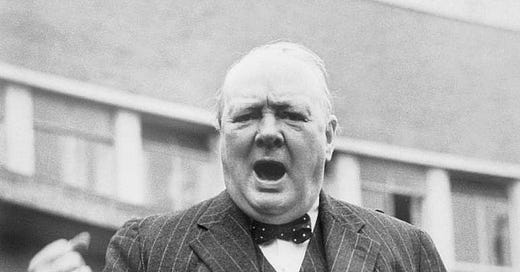Data, active verbs and a-ha!
Week 8 of Words of the Week will take you through advice from Churchill and Orwell
Data
Using data well, to tell a story, is difficult. The best approach is the most radical. In his August 1940 memo Winston Churchill offered the best advice: “If a report relies on detailed analysis of some complicated factors… those should be set out in an appendix”. Leave the text itself as free of clogging numbers as possible. If some data does need to be included in the main body of a report, have the confidence to use the most telling number and only that number. A definitive fact is no more definitive if it is followed by a further seven numbers making essentially the same point slightly less well.
Active verbs
Some style guides become peremptory at this point and demand that you always use active verbs and avoid the passive voice altogether. Even Orwell is tempted to say so. There is, however, no such rule. Indeed, Orwell illustrates the point by accident. In Politics and the English Language, the essay in which he deplores the use of the passive voice, Orwell actually uses it himself and thereby proves himself wrong: “the passive voice is wherever possible used in preference to the active”. The passive voice is perfectly acceptable if a sense of being passive is what you want to communicate.
Most of the time, in business, it isn’t, though, and so the passive voice is usually inappropriate rather than wrong. You will generally want to convey a mood of action and enterprise. The passive voice often distances you from the action and attributes causation to an impersonal force. In a lot of business writing it is used as a distancing device, because the principal is too scared to associate him or herself with the direct action in case it all goes wrong. It sounds feeble to say, for example, that a decision has been made to close your bank account. We learn nothing, probably deliberately, about who made that decision and why. Try to make sure that there is always someone in your writing who is acting. If there is an implied person and that implied person is doing something your writing will avoid descending into passive dullness. Try to be bolder. Try to have more courage. Try to be more direct. Otherwise, you end sounding like you are nor running your own business but that it all happens mysteriously by the dullest alchemy imaginable, as in this 2020 BAT strategy document: “Our business will be further enabled by simplifying our management structure, truly embracing digital transformation, rigorously managing our cost base, and enhancing our internal culture.”
A-ha
Not, in this context, a Norwegian band who had a number 2 hit with Take On Me in October 1985. Instead, a-ha is a corporate buzzword for the moment you realize something, replacing the old, and slightly less cringe-worthy corporate buzzword, the light bulb moment. “For prospects and clients who can potentially have the biggest business impact for us, we help onboard the whole team to help quickly bring them closer to their ‘aha’ moment” as someone wrote in a NetHunt CRM document. Surely you feel daft saying this. I hope you will now. Knowing me, knowing you. A-ha!





